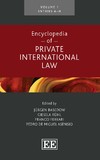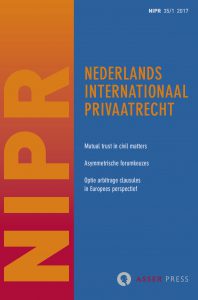RabelsZ Vol. 81 (2017) No. 1
 We have not yet alerted our readers to the first issue of Rabels Zeitschrift für ausländisches und internationales Privatrecht (RabelsZ) which was published in February 2017. So, here we go:
We have not yet alerted our readers to the first issue of Rabels Zeitschrift für ausländisches und internationales Privatrecht (RabelsZ) which was published in February 2017. So, here we go:
Jürgen Basedow, Internationales Einheitsprivatrecht im Zeitalter der Globalisierung (The International Unification of Private Law in the Era of Globalization)
In unifying private law, the international community initially made use of treaties since the subjects of the early years before World War I were conceived of as affecting national sovereignty. As this tool proved functional, it was subsequently retained as the vehicle of “pure private law” unification. In more recent times an increasingly varied number of legal forms can be observed. However, whereas model laws and principles facilitate a spontaneous approximation of laws and allow for the interpretation and supplementation of conventions in legislation and practice, they do not unify the law. Both tools thus have their limits.
The institutionalization of legal unification started after World War II; it has meanwhile acquired a very comprehensive character. There is hardly any subject not capable of being treated by a specialized international agency. In many areas international organizations have also taken the political lead in the unification of laws. The task of safeguarding the consistency of private law in this multi-voiced concert is incumbent on UNIDROIT, UNCITRAL and the Hague Conference.
In recent decades, a new actor has entered the scene: the European Union. As regards the unification of laws within Europe, it has ousted other international organizations. By necessity the other organizations have relocated the centre of their activities to the extra-European, universal field. The EU has become active in that context as well: as a party to universal conventions, not as a producer of uniform law.
The interpretation of uniform law has to a large extent come to be understood as autonomous interpretation taking into account the insights provided by comparative law. With regard to gap-filling, recourse should be had to general principles governing the respective area of law at issue. In the long run, the aim of uniform law application cannot be achieved without institutional arrangements such as the referral of preliminary questions to an international tribunal.
The traditional approach of amending protocols has proven unsatisfactory for adapting aging conventions to a new environment because of the inherent uncertainty and time-consuming nature of ratification procedures. New approaches in some conventions demonstrate that simplified revision procedures are possible and promising.
Ulrich G. Schroeter, Gegenwart und Zukunft des Einheitskaufrechts (Present and Future of Uniform Sales Law)
Uniform sales law forms a part of uniform private law that comprises a number of Conventions unifying either conflict-of-laws rules for sales or substantive sales law. The Hague Convention on the Law Applicable to International Sales of Goods (1955) and the Hague Uniform Sales Laws of 1964 achieved a certain legal uniformity for international sales contracts, but both were ratified by only a few Western European States. The UN (Vienna) Sales Convention of 1980 (CISG) has, in turn, developed into one of the greatest successes of uniform law-making in private law.
The currently more than 80 Contracting States are proof of the fact that the CISG has been accepted by the global community of States. Its Contracting States include most major international trading nations and at the same time countries from all regions of the world. In the upcoming years, the Sales Convention’s ratification by further developing States should be actively encouraged.
By contrast, the extent to which the CISG has been accepted in commercial practice is very difficult to assess empirically. Much is to be said for the assumption that its contractual exclusion is significantly less common than sometimes alleged, given that the courts require a clearly expressed intention to exclude and that any exclusion needs to be agreed upon by both parties, which is often not the case. The assessment of the Sales Convention’s practical importance is further complicated by its frequent application by arbitral tribunals, because the resulting arbitral awards usually remain confidential and thus inaccessible.
In the future, the quest for a uniform interpretation of the Sales Convention is likely to be the most important challenge. Article 7(1) CISG provides some guidance by imposing three interpretative goals that in practice have mostly been observed. They have resulted in a generally uniform interpretation, although limited areas of non-uniformity exist. A general challenge arises from sales contracts’ nature as everyday contracts in international trade, resulting in the uniform sales law’s frequent application by non-specialised lawyers. It is therefore necessary to enable and assist a uniform interpretation through appropriate organisational arrangements, with a cross-border cooperation among specialised academics as the most suitable solution, designed to evaluate and assess international CISG case law and make it available to uniform law users in every country.
The Sales Convention has furthermore contributed to legal uniformity through its use as a model for other international Conventions as well as for domestic and regional law reforms. By contrast, a future revision of the Convention’s text seems neither desirable nor realistic, with its further development best being left to courts and legal academia.
Finally, the increasing number of uniform law acts for international sales calls for a better coordination between the various law-making organisations. In particular, regional uniform law (notably EU law) should respect the existing uniform sales law by explicitly granting priority to the CISG.
Stefan Huber, Transnationales Kreditsicherungsrecht (Secured Transactions Law: A Transnational Perspective)
Asset-based financing requires a secured transactions law which permits the efficient and swift enforcement of security interests. The interplay between substantive law, procedural law and insolvency law is highly complex even at the purely national level. If the object covered by a security interest moves regularly across national frontiers, an additional issue arises: the cross-border recognition of the security interest.
This issue became of particular importance in the era of industrialisation. The intercontinental exchange of goods made high-value vessels indispensable. It is thus not surprising that the first instrument of transnational secured transactions law concerned security interests in vessels. An instrument concerning aircraft followed. Both instruments, adopted in the first half of the 20th century, are based on the idea of recognition by way of harmonising the conflict of laws rules: A security interest duly created under the law of the Contracting State where the vessel or the aircraft is registered is to be recognised by the other Contracting States. Substantive law, procedure and insolvency rules were not yet harmonised, except for the priority between security interests and charges and some minor procedural questions. As a result of this lack of harmonisation, legal uncertainty remained.
From the 1970s on, UNIDROIT and UNCITRAL launched projects pursuing a functional approach. The idea was to establish uniform rules in all areas of law where the efficient cross-border enforcement of security interests required transnational harmonisation. The projects have led to international conventions concerning either certain types of transactions, such as financial leasing, or certain types of assets, such as receivables. The biggest success to date has been the Cape Town Convention on International In- terests in Mobile Equipment with its Aircraft Protocol. Both adopted in 2001, they entered into force in 2006. The combination of general rules in an umbrella convention and specific rules for certain categories of objects in additional protocols – there also exist protocols for railway rolling stock and space assets – was an efficient response to the different needs of different business sectors. 64 states and the EU are already party to the Aircraft Protocol and there are even more contracting parties to the Cape Town Convention itself. The economic impact of the instrument has been high. Having established a new international security interest with a uniform set of substantive, procedural and insolvency rules, the instrument considerably reduces the risks for secured creditors. As a result, credit costs are reduced. Savings in the amount of at least $160 billion are expected over a period of 20 years.
In addition to the conventions, a new type of instrument has more recently appeared in the area of secured transactions law: soft law in the form of model rules and a legislative guide. These instruments are designed for all categories of movable assets.
An analysis of the modern instruments shows that they are based on the following core principles: (1) Non-possessory security interests must be registered in order to be effective against other creditors; (2) the security interest is accessory to the secured obligation; (3) party autonomy is guaranteed within the limits set by third-party interests; (4) states are encouraged to adopt the optional uniform rules on self-help remedies and on interim relief; (5) the registered non-possessory security interest is effective in the event of the debtor’s insolvency; and (6) the international character of a transaction is no longer the predominant connecting factor for determining whether the transnational rules apply.
This list makes clear that the content of the transnational instruments has achieved new dimensions which were not imaginable in the early days of the harmonisation of secured transactions law. At the same time, the number of transnational instruments has risen considerably. A future challenge will be coordinating all these instruments in a way that they constitute a real system of transnational secured transactions law.
Andreas Maurer, Einheitsrecht im internationalen Warentransport (Uniform Law in the International Transport of Goods)
The roots of uniform law in the field of transport law can be traced back to antiquity. Today, a number of international conventions form a uniform law for almost all types of common carriers. Those conventions for trains, trucks and inland navigation vessels, however, must be characterized as regional, even if they encompass three continents. Yet, they are not applicable worldwide. The only uniform law with almost worldwide applicability is the regime on air travel. Whereas the uniform laws on transport with the aforementioned common carriers are mostly evaluated positively, uniform laws on international maritime law are rather fragmented and inconsistent. This situation has not been alleviated by the recent introduction of the so-called Rotterdam rules on multimodal transports. Today it is more than questionable whether in the long run a uniform international maritime law can be introduced. Attempts to implement privately-created uniform law have been unsuccessful. Despite the fact that a number of private organizations are involved in the creation of standard contracts and standard clauses in order to unify regulations on international maritime trade, these rules are not (yet) accepted as being law or equal to law.
Alexander Peukert, Vereinheitlichung des Immaterialgüterrechts: Strukturen, Akteure, Zwecke (Unification of Intellectual Property Law: Structures, Actors and Aims)
Intellectual property (IP) law is among the oldest and most comprehen- sive areas of uniform private law. Nearly all countries are members of the World Intellectual Property Organization and as such agree “to promote the protection of intellectual property throughout the world”. The problem, however, is that this legal protection is subject to the equally universally acknowledged territoriality principle. IP rights are limited to the territory of the country granting them and sometimes remain available only for nation- al citizens/local residents. The article provides an overview of the legal measures taken by different actors to address the tension between global communication and fragmented IP protection. It distinguishes between (i) the harmonization of national IP laws, (ii) the creation of supranational procedures, rights, and courts, and (iii) informal cooperations between private stakeholders and patent offices. The guiding question is whether interna- tional IP law is primarily concerned with establishing a global level playing field or whether it pursues a more tangible aim, namely the strengthening of IP protection “throughout the world”. The article concludes with a critical assessment of the narrative that considers international IP law a great success because of its indeed impressive growth.

 On 17 March 2017 Horst Eidenmüller and John Armour, both from the University of Oxford, organised a one-day conference at St Hugh’s College, Oxford, on ‘Negotiating Brexit’. One panel focused on the effects of Brexit on the resolution of international disputes, including issues of jurisdiction, choice of law, recognition and enforcement as well as international arbitration. Two of the contributions to the conference have recently been published on the
On 17 March 2017 Horst Eidenmüller and John Armour, both from the University of Oxford, organised a one-day conference at St Hugh’s College, Oxford, on ‘Negotiating Brexit’. One panel focused on the effects of Brexit on the resolution of international disputes, including issues of jurisdiction, choice of law, recognition and enforcement as well as international arbitration. Two of the contributions to the conference have recently been published on the 